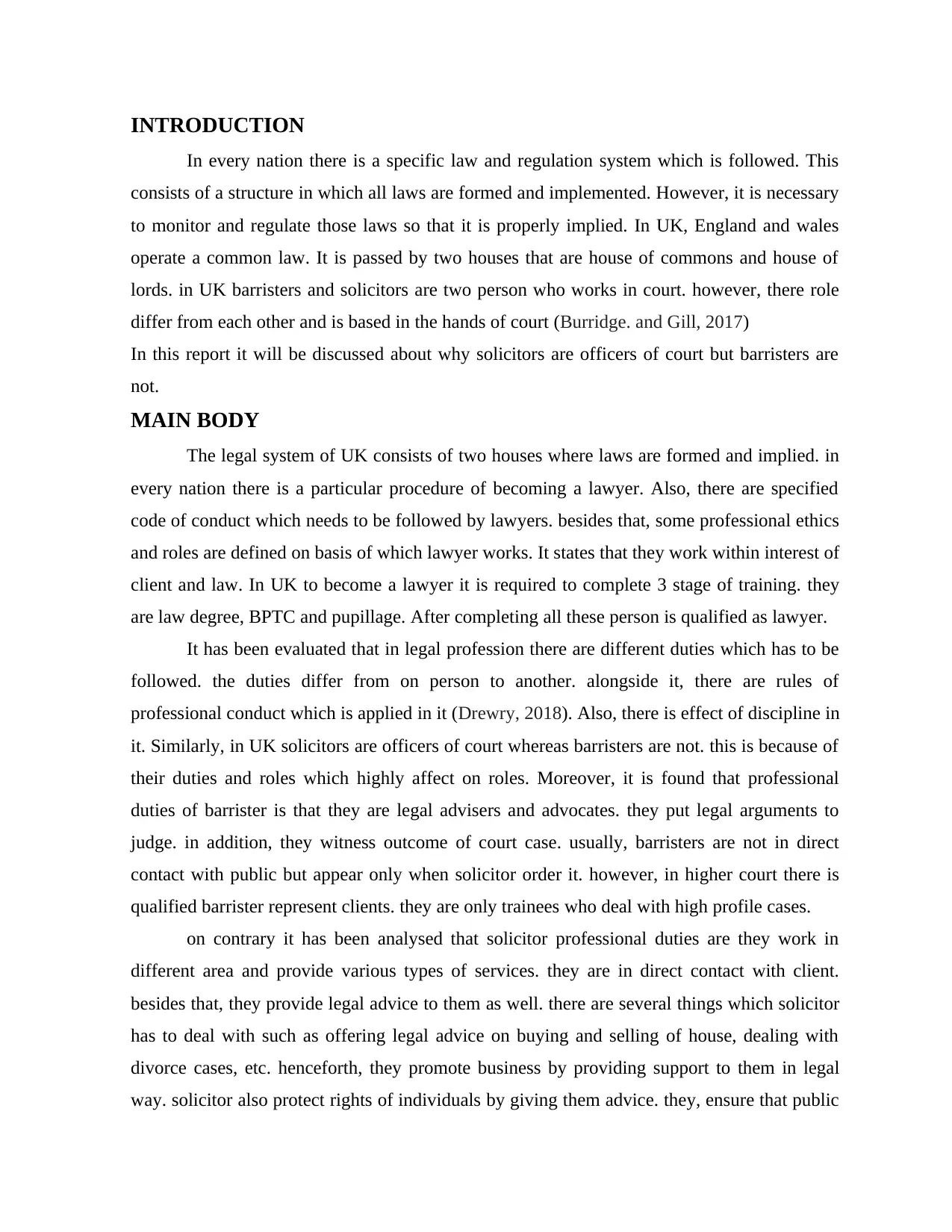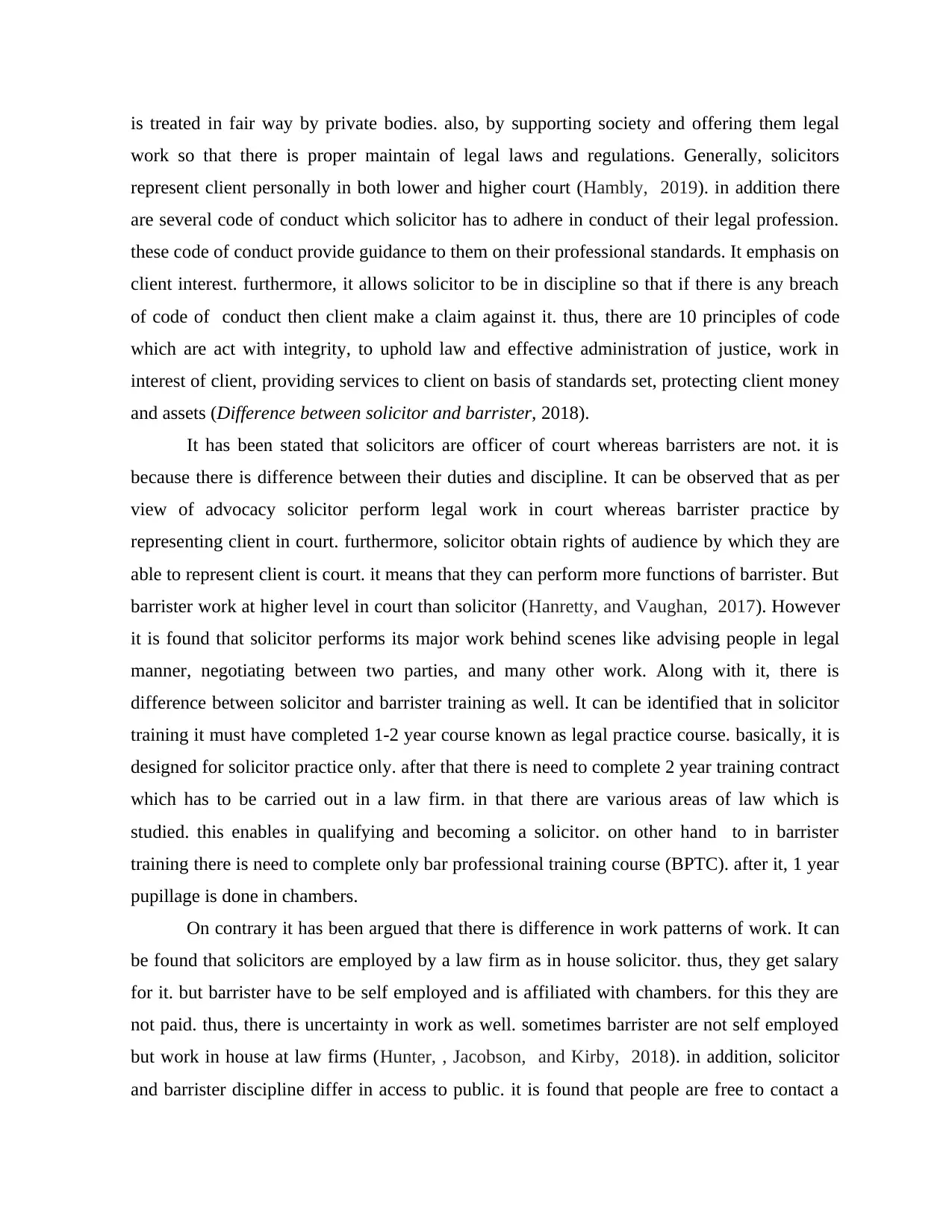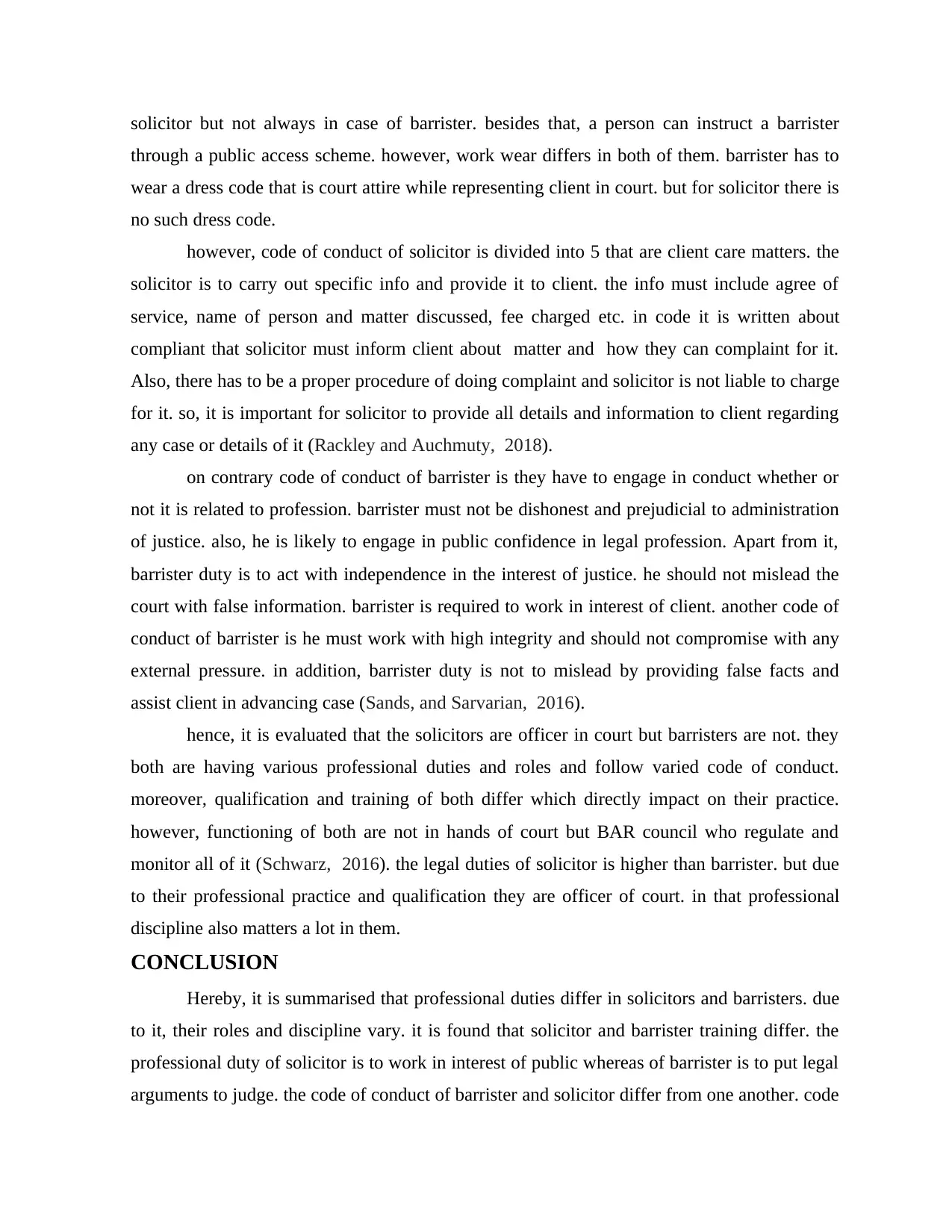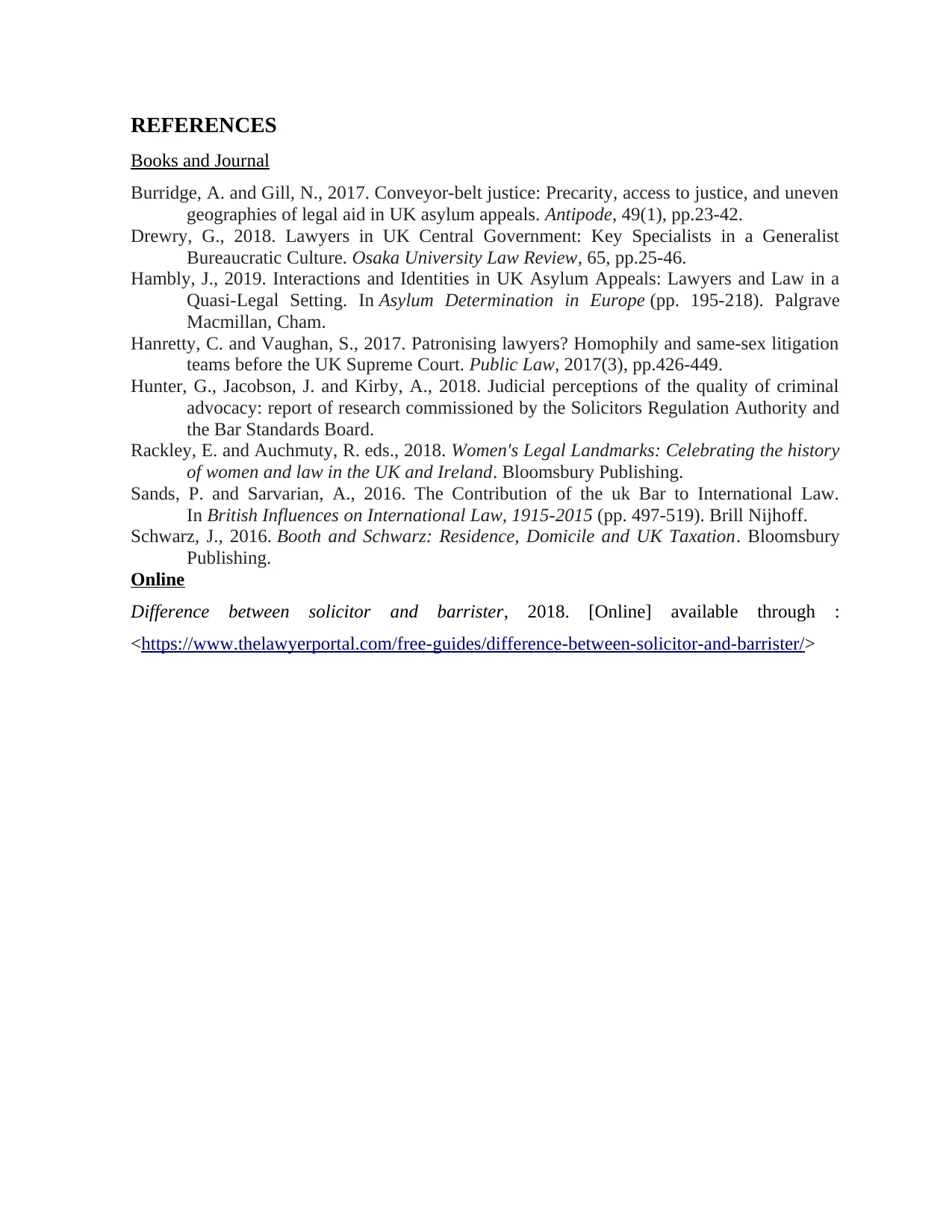Comparing Roles: Solicitors and Barristers in the UK Legal System
VerifiedAdded on 2023/01/11
|8
|1899
|62
Report
AI Summary
This report provides a comprehensive overview of the roles and responsibilities of solicitors and barristers within the UK legal system. It explores the distinctions between these two key legal professionals, examining their duties, training requirements, and codes of conduct. The report highlights that solicitors are officers of the court due to their professional practice and qualifications, even though the legal duties of a solicitor are higher than a barrister. The report delves into the differences in their training, work patterns, and discipline, emphasizing that while solicitors often work directly with clients and provide a wider range of services, barristers typically specialize in advocacy and legal arguments in court. The report also mentions the role of the Bar Council in regulating and monitoring the functioning of both solicitors and barristers. Overall, the report provides a detailed analysis of the UK legal system, focusing on how solicitors and barristers operate within it.

WORD
Paraphrase This Document
Need a fresh take? Get an instant paraphrase of this document with our AI Paraphraser

Table of Contents
INTRODUCTION.......................................................................................................................3
MAIN BODY...............................................................................................................................3
CONCLUSION............................................................................................................................4
REFERENCES............................................................................................................................5
INTRODUCTION.......................................................................................................................3
MAIN BODY...............................................................................................................................3
CONCLUSION............................................................................................................................4
REFERENCES............................................................................................................................5

INTRODUCTION
In every nation there is a specific law and regulation system which is followed. This
consists of a structure in which all laws are formed and implemented. However, it is necessary
to monitor and regulate those laws so that it is properly implied. In UK, England and wales
operate a common law. It is passed by two houses that are house of commons and house of
lords. in UK barristers and solicitors are two person who works in court. however, there role
differ from each other and is based in the hands of court (Burridge. and Gill, 2017)
In this report it will be discussed about why solicitors are officers of court but barristers are
not.
MAIN BODY
The legal system of UK consists of two houses where laws are formed and implied. in
every nation there is a particular procedure of becoming a lawyer. Also, there are specified
code of conduct which needs to be followed by lawyers. besides that, some professional ethics
and roles are defined on basis of which lawyer works. It states that they work within interest of
client and law. In UK to become a lawyer it is required to complete 3 stage of training. they
are law degree, BPTC and pupillage. After completing all these person is qualified as lawyer.
It has been evaluated that in legal profession there are different duties which has to be
followed. the duties differ from on person to another. alongside it, there are rules of
professional conduct which is applied in it (Drewry, 2018). Also, there is effect of discipline in
it. Similarly, in UK solicitors are officers of court whereas barristers are not. this is because of
their duties and roles which highly affect on roles. Moreover, it is found that professional
duties of barrister is that they are legal advisers and advocates. they put legal arguments to
judge. in addition, they witness outcome of court case. usually, barristers are not in direct
contact with public but appear only when solicitor order it. however, in higher court there is
qualified barrister represent clients. they are only trainees who deal with high profile cases.
on contrary it has been analysed that solicitor professional duties are they work in
different area and provide various types of services. they are in direct contact with client.
besides that, they provide legal advice to them as well. there are several things which solicitor
has to deal with such as offering legal advice on buying and selling of house, dealing with
divorce cases, etc. henceforth, they promote business by providing support to them in legal
way. solicitor also protect rights of individuals by giving them advice. they, ensure that public
In every nation there is a specific law and regulation system which is followed. This
consists of a structure in which all laws are formed and implemented. However, it is necessary
to monitor and regulate those laws so that it is properly implied. In UK, England and wales
operate a common law. It is passed by two houses that are house of commons and house of
lords. in UK barristers and solicitors are two person who works in court. however, there role
differ from each other and is based in the hands of court (Burridge. and Gill, 2017)
In this report it will be discussed about why solicitors are officers of court but barristers are
not.
MAIN BODY
The legal system of UK consists of two houses where laws are formed and implied. in
every nation there is a particular procedure of becoming a lawyer. Also, there are specified
code of conduct which needs to be followed by lawyers. besides that, some professional ethics
and roles are defined on basis of which lawyer works. It states that they work within interest of
client and law. In UK to become a lawyer it is required to complete 3 stage of training. they
are law degree, BPTC and pupillage. After completing all these person is qualified as lawyer.
It has been evaluated that in legal profession there are different duties which has to be
followed. the duties differ from on person to another. alongside it, there are rules of
professional conduct which is applied in it (Drewry, 2018). Also, there is effect of discipline in
it. Similarly, in UK solicitors are officers of court whereas barristers are not. this is because of
their duties and roles which highly affect on roles. Moreover, it is found that professional
duties of barrister is that they are legal advisers and advocates. they put legal arguments to
judge. in addition, they witness outcome of court case. usually, barristers are not in direct
contact with public but appear only when solicitor order it. however, in higher court there is
qualified barrister represent clients. they are only trainees who deal with high profile cases.
on contrary it has been analysed that solicitor professional duties are they work in
different area and provide various types of services. they are in direct contact with client.
besides that, they provide legal advice to them as well. there are several things which solicitor
has to deal with such as offering legal advice on buying and selling of house, dealing with
divorce cases, etc. henceforth, they promote business by providing support to them in legal
way. solicitor also protect rights of individuals by giving them advice. they, ensure that public
⊘ This is a preview!⊘
Do you want full access?
Subscribe today to unlock all pages.

Trusted by 1+ million students worldwide

is treated in fair way by private bodies. also, by supporting society and offering them legal
work so that there is proper maintain of legal laws and regulations. Generally, solicitors
represent client personally in both lower and higher court (Hambly, 2019). in addition there
are several code of conduct which solicitor has to adhere in conduct of their legal profession.
these code of conduct provide guidance to them on their professional standards. It emphasis on
client interest. furthermore, it allows solicitor to be in discipline so that if there is any breach
of code of conduct then client make a claim against it. thus, there are 10 principles of code
which are act with integrity, to uphold law and effective administration of justice, work in
interest of client, providing services to client on basis of standards set, protecting client money
and assets (Difference between solicitor and barrister, 2018).
It has been stated that solicitors are officer of court whereas barristers are not. it is
because there is difference between their duties and discipline. It can be observed that as per
view of advocacy solicitor perform legal work in court whereas barrister practice by
representing client in court. furthermore, solicitor obtain rights of audience by which they are
able to represent client is court. it means that they can perform more functions of barrister. But
barrister work at higher level in court than solicitor (Hanretty, and Vaughan, 2017). However
it is found that solicitor performs its major work behind scenes like advising people in legal
manner, negotiating between two parties, and many other work. Along with it, there is
difference between solicitor and barrister training as well. It can be identified that in solicitor
training it must have completed 1-2 year course known as legal practice course. basically, it is
designed for solicitor practice only. after that there is need to complete 2 year training contract
which has to be carried out in a law firm. in that there are various areas of law which is
studied. this enables in qualifying and becoming a solicitor. on other hand to in barrister
training there is need to complete only bar professional training course (BPTC). after it, 1 year
pupillage is done in chambers.
On contrary it has been argued that there is difference in work patterns of work. It can
be found that solicitors are employed by a law firm as in house solicitor. thus, they get salary
for it. but barrister have to be self employed and is affiliated with chambers. for this they are
not paid. thus, there is uncertainty in work as well. sometimes barrister are not self employed
but work in house at law firms (Hunter, , Jacobson, and Kirby, 2018). in addition, solicitor
and barrister discipline differ in access to public. it is found that people are free to contact a
work so that there is proper maintain of legal laws and regulations. Generally, solicitors
represent client personally in both lower and higher court (Hambly, 2019). in addition there
are several code of conduct which solicitor has to adhere in conduct of their legal profession.
these code of conduct provide guidance to them on their professional standards. It emphasis on
client interest. furthermore, it allows solicitor to be in discipline so that if there is any breach
of code of conduct then client make a claim against it. thus, there are 10 principles of code
which are act with integrity, to uphold law and effective administration of justice, work in
interest of client, providing services to client on basis of standards set, protecting client money
and assets (Difference between solicitor and barrister, 2018).
It has been stated that solicitors are officer of court whereas barristers are not. it is
because there is difference between their duties and discipline. It can be observed that as per
view of advocacy solicitor perform legal work in court whereas barrister practice by
representing client in court. furthermore, solicitor obtain rights of audience by which they are
able to represent client is court. it means that they can perform more functions of barrister. But
barrister work at higher level in court than solicitor (Hanretty, and Vaughan, 2017). However
it is found that solicitor performs its major work behind scenes like advising people in legal
manner, negotiating between two parties, and many other work. Along with it, there is
difference between solicitor and barrister training as well. It can be identified that in solicitor
training it must have completed 1-2 year course known as legal practice course. basically, it is
designed for solicitor practice only. after that there is need to complete 2 year training contract
which has to be carried out in a law firm. in that there are various areas of law which is
studied. this enables in qualifying and becoming a solicitor. on other hand to in barrister
training there is need to complete only bar professional training course (BPTC). after it, 1 year
pupillage is done in chambers.
On contrary it has been argued that there is difference in work patterns of work. It can
be found that solicitors are employed by a law firm as in house solicitor. thus, they get salary
for it. but barrister have to be self employed and is affiliated with chambers. for this they are
not paid. thus, there is uncertainty in work as well. sometimes barrister are not self employed
but work in house at law firms (Hunter, , Jacobson, and Kirby, 2018). in addition, solicitor
and barrister discipline differ in access to public. it is found that people are free to contact a
Paraphrase This Document
Need a fresh take? Get an instant paraphrase of this document with our AI Paraphraser

solicitor but not always in case of barrister. besides that, a person can instruct a barrister
through a public access scheme. however, work wear differs in both of them. barrister has to
wear a dress code that is court attire while representing client in court. but for solicitor there is
no such dress code.
however, code of conduct of solicitor is divided into 5 that are client care matters. the
solicitor is to carry out specific info and provide it to client. the info must include agree of
service, name of person and matter discussed, fee charged etc. in code it is written about
compliant that solicitor must inform client about matter and how they can complaint for it.
Also, there has to be a proper procedure of doing complaint and solicitor is not liable to charge
for it. so, it is important for solicitor to provide all details and information to client regarding
any case or details of it (Rackley and Auchmuty, 2018).
on contrary code of conduct of barrister is they have to engage in conduct whether or
not it is related to profession. barrister must not be dishonest and prejudicial to administration
of justice. also, he is likely to engage in public confidence in legal profession. Apart from it,
barrister duty is to act with independence in the interest of justice. he should not mislead the
court with false information. barrister is required to work in interest of client. another code of
conduct of barrister is he must work with high integrity and should not compromise with any
external pressure. in addition, barrister duty is not to mislead by providing false facts and
assist client in advancing case (Sands, and Sarvarian, 2016).
hence, it is evaluated that the solicitors are officer in court but barristers are not. they
both are having various professional duties and roles and follow varied code of conduct.
moreover, qualification and training of both differ which directly impact on their practice.
however, functioning of both are not in hands of court but BAR council who regulate and
monitor all of it (Schwarz, 2016). the legal duties of solicitor is higher than barrister. but due
to their professional practice and qualification they are officer of court. in that professional
discipline also matters a lot in them.
CONCLUSION
Hereby, it is summarised that professional duties differ in solicitors and barristers. due
to it, their roles and discipline vary. it is found that solicitor and barrister training differ. the
professional duty of solicitor is to work in interest of public whereas of barrister is to put legal
arguments to judge. the code of conduct of barrister and solicitor differ from one another. code
through a public access scheme. however, work wear differs in both of them. barrister has to
wear a dress code that is court attire while representing client in court. but for solicitor there is
no such dress code.
however, code of conduct of solicitor is divided into 5 that are client care matters. the
solicitor is to carry out specific info and provide it to client. the info must include agree of
service, name of person and matter discussed, fee charged etc. in code it is written about
compliant that solicitor must inform client about matter and how they can complaint for it.
Also, there has to be a proper procedure of doing complaint and solicitor is not liable to charge
for it. so, it is important for solicitor to provide all details and information to client regarding
any case or details of it (Rackley and Auchmuty, 2018).
on contrary code of conduct of barrister is they have to engage in conduct whether or
not it is related to profession. barrister must not be dishonest and prejudicial to administration
of justice. also, he is likely to engage in public confidence in legal profession. Apart from it,
barrister duty is to act with independence in the interest of justice. he should not mislead the
court with false information. barrister is required to work in interest of client. another code of
conduct of barrister is he must work with high integrity and should not compromise with any
external pressure. in addition, barrister duty is not to mislead by providing false facts and
assist client in advancing case (Sands, and Sarvarian, 2016).
hence, it is evaluated that the solicitors are officer in court but barristers are not. they
both are having various professional duties and roles and follow varied code of conduct.
moreover, qualification and training of both differ which directly impact on their practice.
however, functioning of both are not in hands of court but BAR council who regulate and
monitor all of it (Schwarz, 2016). the legal duties of solicitor is higher than barrister. but due
to their professional practice and qualification they are officer of court. in that professional
discipline also matters a lot in them.
CONCLUSION
Hereby, it is summarised that professional duties differ in solicitors and barristers. due
to it, their roles and discipline vary. it is found that solicitor and barrister training differ. the
professional duty of solicitor is to work in interest of public whereas of barrister is to put legal
arguments to judge. the code of conduct of barrister and solicitor differ from one another. code

of conduct of solicitor is client care matters. the solicitor is to carry out specific info and
provide it to client. but of barrister is they have to engage in conduct whether or not it is
related to profession.
provide it to client. but of barrister is they have to engage in conduct whether or not it is
related to profession.
⊘ This is a preview!⊘
Do you want full access?
Subscribe today to unlock all pages.

Trusted by 1+ million students worldwide

REFERENCES
Books and Journal
Burridge, A. and Gill, N., 2017. Conveyor‐belt justice: Precarity, access to justice, and uneven
geographies of legal aid in UK asylum appeals. Antipode, 49(1), pp.23-42.
Drewry, G., 2018. Lawyers in UK Central Government: Key Specialists in a Generalist
Bureaucratic Culture. Osaka University Law Review, 65, pp.25-46.
Hambly, J., 2019. Interactions and Identities in UK Asylum Appeals: Lawyers and Law in a
Quasi-Legal Setting. In Asylum Determination in Europe (pp. 195-218). Palgrave
Macmillan, Cham.
Hanretty, C. and Vaughan, S., 2017. Patronising lawyers? Homophily and same-sex litigation
teams before the UK Supreme Court. Public Law, 2017(3), pp.426-449.
Hunter, G., Jacobson, J. and Kirby, A., 2018. Judicial perceptions of the quality of criminal
advocacy: report of research commissioned by the Solicitors Regulation Authority and
the Bar Standards Board.
Rackley, E. and Auchmuty, R. eds., 2018. Women's Legal Landmarks: Celebrating the history
of women and law in the UK and Ireland. Bloomsbury Publishing.
Sands, P. and Sarvarian, A., 2016. The Contribution of the uk Bar to International Law.
In British Influences on International Law, 1915-2015 (pp. 497-519). Brill Nijhoff.
Schwarz, J., 2016. Booth and Schwarz: Residence, Domicile and UK Taxation. Bloomsbury
Publishing.
Online
Difference between solicitor and barrister, 2018. [Online] available through :
<https://www.thelawyerportal.com/free-guides/difference-between-solicitor-and-barrister/>
Books and Journal
Burridge, A. and Gill, N., 2017. Conveyor‐belt justice: Precarity, access to justice, and uneven
geographies of legal aid in UK asylum appeals. Antipode, 49(1), pp.23-42.
Drewry, G., 2018. Lawyers in UK Central Government: Key Specialists in a Generalist
Bureaucratic Culture. Osaka University Law Review, 65, pp.25-46.
Hambly, J., 2019. Interactions and Identities in UK Asylum Appeals: Lawyers and Law in a
Quasi-Legal Setting. In Asylum Determination in Europe (pp. 195-218). Palgrave
Macmillan, Cham.
Hanretty, C. and Vaughan, S., 2017. Patronising lawyers? Homophily and same-sex litigation
teams before the UK Supreme Court. Public Law, 2017(3), pp.426-449.
Hunter, G., Jacobson, J. and Kirby, A., 2018. Judicial perceptions of the quality of criminal
advocacy: report of research commissioned by the Solicitors Regulation Authority and
the Bar Standards Board.
Rackley, E. and Auchmuty, R. eds., 2018. Women's Legal Landmarks: Celebrating the history
of women and law in the UK and Ireland. Bloomsbury Publishing.
Sands, P. and Sarvarian, A., 2016. The Contribution of the uk Bar to International Law.
In British Influences on International Law, 1915-2015 (pp. 497-519). Brill Nijhoff.
Schwarz, J., 2016. Booth and Schwarz: Residence, Domicile and UK Taxation. Bloomsbury
Publishing.
Online
Difference between solicitor and barrister, 2018. [Online] available through :
<https://www.thelawyerportal.com/free-guides/difference-between-solicitor-and-barrister/>
Paraphrase This Document
Need a fresh take? Get an instant paraphrase of this document with our AI Paraphraser

1 out of 8
Related Documents
Your All-in-One AI-Powered Toolkit for Academic Success.
+13062052269
info@desklib.com
Available 24*7 on WhatsApp / Email
![[object Object]](/_next/static/media/star-bottom.7253800d.svg)
Unlock your academic potential
Copyright © 2020–2026 A2Z Services. All Rights Reserved. Developed and managed by ZUCOL.





